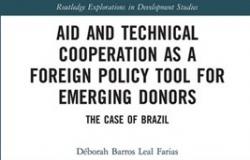Book Review - Aid and Technical Cooperation as a Foreign Policy Tool for Emerging Donors: The Case of Brazil

Aid and Technical Cooperation as a Foreign Policy Tool for Emerging Donors: The Case of Brazil, by Déborah Barros Leal Farias. Abingdon: Routledge 2018. 200 pp., £96 hardcover 9780815362623, £29.59 paperback 9870367666545, £29.59 e-book 9781351111799
During their political and economic rise in the 2000s and 2010s, several emerging powers from the global south (China, Brazil, India and South Africa) reinforced their technical cooperation efforts with other low and middle-income countries in Africa. These emerging donors used South-South cooperation as a major tool to reshape their foreign policy strategies. As a consequence, a vibrant academic debate has emerged to understand the intricacies of South-South cooperation efforts. Many of these studies published over the last few years explore the different political and economic interests that have motivated these emerging powers to engage in South-South cooperation. Déborah Barros Leal Farias’s book intervenes in this debate by shedding light on a question often overlooked. Her book examines why a country would provide knowledge and expertise in the context of technical cooperation to another country without demanding anything in return (“with no strings attached”). Her research question is particularly inspired by the case of Brazil, which in the 2000s started to prioritise the development of technical cooperation agreements with other developing countries without including conditionalities (“with no strings attached”). Unlike many other authoritative studies focusing on Brazil’s South-South cooperation activities over the last two decades, this book situates Brazil’s technical cooperation in a much broader context, spanning sixty years of technical cooperation history and including a discussion of the technical cooperation activities of traditional donors in the second half of the twentieth century and the recent phenomenon of the rise of new donors from the global south in the first two decades of the twenty-first century.
 Barros Leal Farias argues that a country committed to providing unconditional technical cooperation as part of its development assistance framework is strategically prioritising mid- and long-term diplomatic gains over short-term commercial gains. In development cooperation with no strings attached (that is, technical cooperation agreements without conditionalities and other ties included), a country counts on the expectation of reciprocity from its recipient countries. The book develops this argument by providing a comprehensive overview of international development and technical cooperation focused on traditional Western donors and emerging donors from the global south. The author starts with a thorough theoretical discussion of the contribution of major IR theories and the concepts of soft power and middle power diplomacy to the debate on (un)conditional technical cooperation. Thereafter, the book sheds light on traditional (Western) donors and the historical development of technical cooperation in the second half of the twentieth century. Then, the book moves on to South-South cooperation among developing countries and emerging donors (China, India and South Africa) in the 2000s, which have significantly blurred the line between traditional donors and recipients. The discussion of South-South cooperation over the last two decades is once again situated in a broader historical context, tracing the characteristics of South-South cooperation since the 1960s. After comparing some characteristics of the different approaches of China, India and South Africa to both tied and untied development cooperation, the focus then falls on the remaining member of the so-called BRICS and the book’s principal case study, Brazil’s development assistance since the 2000s.
Barros Leal Farias argues that a country committed to providing unconditional technical cooperation as part of its development assistance framework is strategically prioritising mid- and long-term diplomatic gains over short-term commercial gains. In development cooperation with no strings attached (that is, technical cooperation agreements without conditionalities and other ties included), a country counts on the expectation of reciprocity from its recipient countries. The book develops this argument by providing a comprehensive overview of international development and technical cooperation focused on traditional Western donors and emerging donors from the global south. The author starts with a thorough theoretical discussion of the contribution of major IR theories and the concepts of soft power and middle power diplomacy to the debate on (un)conditional technical cooperation. Thereafter, the book sheds light on traditional (Western) donors and the historical development of technical cooperation in the second half of the twentieth century. Then, the book moves on to South-South cooperation among developing countries and emerging donors (China, India and South Africa) in the 2000s, which have significantly blurred the line between traditional donors and recipients. The discussion of South-South cooperation over the last two decades is once again situated in a broader historical context, tracing the characteristics of South-South cooperation since the 1960s. After comparing some characteristics of the different approaches of China, India and South Africa to both tied and untied development cooperation, the focus then falls on the remaining member of the so-called BRICS and the book’s principal case study, Brazil’s development assistance since the 2000s.
By using a realist-constructivist framework, the author traces the reasons which motivate a country to prioritise diplomatic (development assistance without strings) over commercial (development assistance with strings) gains in technical cooperation. By providing this comprehensive overview ranging from traditional donors from the developed world to emerging donors from the developing world and finally zooming in on the case of Brazil, the book manages to situate Brazil’s development assistance in the context of South-South cooperation and traditional development assistance. The author explains the ideational (foreign policy ideas), institutional (institutional and legal foreign policymaking structure) and positional (foreign policymakers’ perception of the position of the country in the international system) forces behind Brazil’s no-strings-attached technical cooperation approach since the 2000s. The case study adds additional weight to the crystalising argument supported by many other studies on Brazil’s international relations that Brazil as an emerging donor approached technical cooperation from a perspective that differs starkly from that embraced by traditional donors. Instead of a condescending attitude, seeking to impose its own models, Brazil approached technical cooperation activities through a more cooperative, demand-driven and solidarity-based attitude with its African partners. This approach has rendered major diplomatic successes to Brazil on the international stage, such as the selection of the Brazilian José Graziano da Silva as the FAO Director-General in 2011. He won the vote particularly due to the strong support of those African countries that were involved in untied technical cooperation agreements with Brazil.
The book highlights important commonalities and differences in the technical cooperation approach of the emerging donors China, India and South Africa, which are then contrasted with the case of Brazil’s technical cooperation activities in Africa. In this context, a more nuanced view of Brazil’s technical cooperation in those sectors where the country distinguished itself over the last two decades – such as health, food security, renewable energy and infrastructure development – would have added to the compelling argument about Brazil’s technical cooperation approach with no strings attached. A more detailed analysis of Brazil’s technical cooperation activities would also have supported more effectively the author’s claims about the uniqueness of Brazil’s untied approach in South-South cooperation. And even though the author argues that a comparison between Brazil and other emerging donors is not the goal of the book, such a comparative element would have strengthened the author’s argument about the uniqueness of Brazil’s approach.
By including a historical perspective on both traditional Western donors and emerging donors, which have blurred the line between donor and recipient countries, the book advances the debate on how no-strings-attached technical cooperation can further a country’s self-interest and foreign policy goals in the international system and how emerging donors, particularly Brazil, have significantly reshaped the parameters of technical cooperation and development assistance. In addition, the book serves as an excellent introduction to dominant dynamics and processes of technical cooperation efforts over the second half of the twentieth century and the transformative changes that took place over the last two decades with emerging donors from the global south.
Dr. Markus Fraundorfer is Lecturer in Global Governance in the School of Politics and International Studies at the University of Leeds. He is also the programme director of the School’s MA in Global Governance & Diplomacy.


